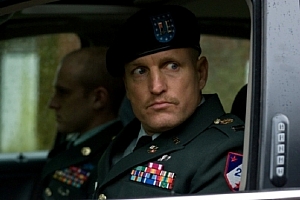The Messenger is former Israeli Oren Moverman’s first film as director, after a number of writing jobs, including co-writing I’m Not There with director Todd Haynes. The film is another in the growing trend of de-politicizing the war in Iraq, by focusing it on the immediate human level. The film is about Will Montgomery (Ben Foster), a decorated combat vet recently come home from Iraq who is counting down the days until his release from the army. For the remainder of his service, he’s been assigned to Tony Stone (Woody Harrelson). His job is to notify first of kin when a relative dies in action. We follow as Tony and Will go about their difficult task, spending time at the bar, and see Will grappling with his mission, finding it difficult to be as dry and formal as the guidebook requires.
There’s very little that’s surprising about this film, but that thought didn’t really strike me until I left the theater. It is a good and compassionate film, that didn’t feel (at least to me) exploitative in the least. Every message they deliver gets a different kind of response, and all ring true. Both men take the task seriously, but Will in particular is trying to bring as much sympathy and nobility as he can. Ben Foster is a young actor who has been steadily gaining steam in the past few years (he gave the best performance in the Russell Crowe-Christian Bale vehicle 3:10 to Yuma), and here does terrific work with a good part. The first scenes don’t make Will seem like the kind of guy for whom sympathy and nobility would be prime goals. He likes to play heavy-metal in his lonely-looking apartment (to protestation from his neighbors), he is quite unhappy with being assigned any new job so close to his release, much less this one, and the only relationship he has is with his childhood sweetheart, who he sleeps with even though she’s about to get engaged to another man. He’s got a lot of anger in him. But Foster connects the deep anger and frustration in Will with the sadness that he feels with every message he delivers. Will’s character, which seemed pretty obvious initially, is allowed more dimensions than one might expect, and it’s a credit to Moverman and Foster that that occurred.
Harrelson has the smaller, showier role. The thrice married recovering alcoholic Tony has a colorful colloquialism ready for most situations, and is very good at banter. His character is a bit more obvious, where he appears to be strictly adhering to the guide-book as a defense mechanism, so that he won’t have to let as much of the family’s pain in. It’s a slighter part (though the character does have some genuinely good moments), but Harrelson makes the most of it, and gives his most likable performance in a long time. The other major character in the film is an army wife played by Samantha Morton, who is one of the recipients of Tony and Will’s visits. Will is particularly taken with her, and begins a tentative friendship with her. Morton is one of the best actresses working today, and it’s a credit to her that her part works as well as it does, because aside from one surprising scene (which doesn’t work as written), her part is rather generic. Steve Buscemi and Eamonn Walker have very small roles in the film, and both do fine work as usual.
The films looks good, is generally elegantly composed and shot (a higher than average amount of long takes), and only seriously falters at the end, which was a bit too neat for my tastes. But it is a solid, well-made humane film that is elevated by some really good actors putting in really good work.
Screenings:
18.7 at 14:30
SHLOMO PORATH







[…] and Stanley Tucci in ‘The Lovely Bones’), and Woody Harrelson is marvelous in ‘The Messenger’, but I can’t imagine any of them over-shadowing Waltz’s one of a kind performance, on […]
Comments are closed.